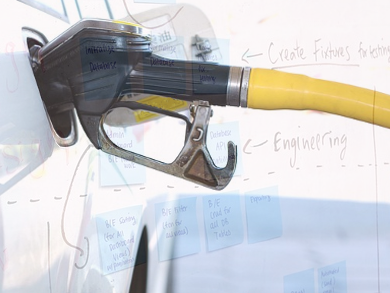Electrofuels, which are drop-in replacement fuels made directly from carbon dioxide, are repeatedly discussed as an option to make transportation carbon-neutral. Mariliis Lehtveer, Chalmers University of Technology, Gothenburg, and Linköping University, both Sweden, and colleagues have performed a theoretical study to investigate if electrofuels are also price-competitive enough to play a role in a future low-carbon-emission transportation system.
The results show quite clearly that electrofuels, at least in the transport sector, will not be competitive within the next decades. It would be more favorable to store the gas than convert it into transportation fuels, according to the team.
What Electrofuels Are
Electrofuels are fuels that are produced directly from carbon dioxide, which is reduced by hydrogen. To avoid carbon emissions, all the energy involved in the process, even for electrolyzing water in hydrogen production, has to come from renewable energy sources. The simplest liquid fuel produced that way is methanol, which can be upgraded to various other energetic liquids, even diesel or gasoline. Referring to the production method, electrofuels are also known as “power-to-liquid”, “power-to-gas”, or synfuels.
If all of the electric power needed to produce the fuel—and the hydrogen—comes from noncarbon sources, one liter of electrofuel will be entirely carbon-neutral, which is very compelling in the context of climate change mitigation. However, as any chemist knows from their undergraduate studies, a lot of power is needed to make energetic carbon compounds from scratch: hydrogen must be prepared by water electrolysis, and carbon dioxide must be reduced in another energy-demanding process, even if an elaborate catalyst is available or, as frequently proposed, microorganisms in bioreactors do the task.
As a positive aspect, the production of electrofuels does not need large amounts of land and does not compete with food production, for which biofuels have often been criticized. Therefore, electrofuels are often regarded as a valuable alternative to biofuels.
Electrofuels in the Global Energy Transition
Whether or not electrofuels will contribute to global greenhouse-gas mitigation strategies strongly depends on their economic competitiveness. This question has been addressed by the researchers. Building upon a systems engineering model for a global energy transition within the next decades, the team analyzed the conditions under which electrofuels in transport could be part of a cost-effective solution when carbon dioxide emission levels are restricted. Using their model, the researchers performed simulations of various cases, each case representing different economic and technological conditions.
The main results of the modelling simulations were clear-cut: “Electrofuels are more expensive than the other fuel options, and production is energy-intensive,” the researchers concluded. But despite this general uncompetitiveness, they also identified cases where electrofuels could be a valuable alternative. One of these scenarios was when electric power from renewables becomes significantly cheaper, and another “positive” scenario for electrofuels was one in which, for several reasons, carbon dioxide storage is not an option.
Carbon dioxide capture and storage has often been regarded as a possibility to remove carbon dioxide waste or filter it from the air. However, large-scale carbon dioxide storage sites are often met with opposition in the communities, or it can be simply impossible to store carbon dioxide for various reasons. In these cases, carbon recycling becomes more attractive, and electrofuels could become a more reasonable option, the study says.
Predicting the Future Is Always Difficult
However, the researchers admit, even the best model cannot predict the future with absolute certainty. Parameters might change, and, as they point out, the study did not include the uncertainty of prices, infrastructure variables, or simply consumer choice. Special sectors such as aviation were not considered as well.
Therefore, follow-up studies might draw a more differentiated picture on the use of synthetic fuels. Still, the basic message remains the same: Although electrofuels have a low carbon footprint in theory, this does not mean they are competitive, even in a low-carbon economy.
- What Future for Electrofuels in Transport? Analysis of Cost Competitiveness in Global Climate Mitigation,
Mariliis Lehtveer, Selma Brynolf, Maria Grahn,
Environ. Sci. Technol. 2019.
https://doi.org/10.1021/acs.est.8b05243




